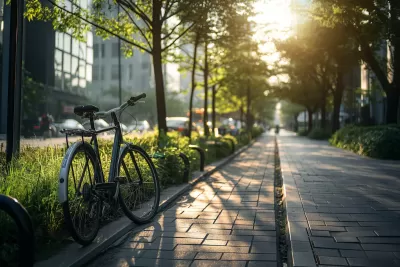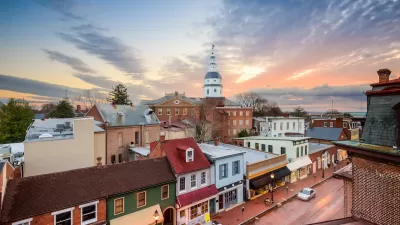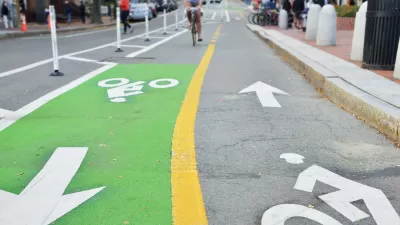Discover how the Sustainable Urban Design Framework helps planners create livable, sustainable communities. Nico Larco from the University of Oregon explores a new tool and book in the latest “Talking Headways” podcast.

Urban planners are increasingly grappling with the difficult task of how to create more sustainable and livable communities. This has been challenging as sustainability in urban design is a complicated topic that includes a wide range of scales, disciplines, and areas of expertise. In the latest episode of the “Talking Headways” podcast, Nico Larco from the University of Oregon discusses a new, comprehensive approach based on the Sustainable Urban Design Framework and how it can be used by planners, designers, elected officials, and community stakeholders. The framework organizes a new book by Larco and Kaarin Knudson titled the Sustainable Urban Design Handbook (excerpts here).
The podcast gives an overview on the framework and describes its five sustainability-focused outcome areas (Energy Use and GHG based on Transportation and Land Use, Water, Ecology and Habitat, Energy Use and GHG Production (Non-Transportation), and Equity and Health) and four scales of intervention (Region/City, District/Neighborhood, Block/Street, Project/Parcel).
The podcast also dives deep on a few topics such as the critical role density plays in many aspects of sustainable communities. Often, in the US, sustainable approaches seem to be a band-aid trying to address a lack of underlying density. Creating density requires a multifaceted approach and can impact mode choice, stormwater management, ecological health, energy use, and resident's cost of living, access to goods and services, amount of physical activity, safety, and ability to improve their socio-economic condition.
This podcast serves as a quick introduction to this new tool that can help with design, planning, and community engagement around sustainability and livability.
FULL STORY: Sustainable Urban Design - Nico Larco on the Talking Headways Podcast

Trump Administration Could Effectively End Housing Voucher Program
Federal officials are eyeing major cuts to the Section 8 program that helps millions of low-income households pay rent.

Planetizen Federal Action Tracker
A weekly monitor of how Trump’s orders and actions are impacting planners and planning in America.

Ken Jennings Launches Transit Web Series
The Jeopardy champ wants you to ride public transit.

Opinion: Transit Agencies Must View Service Cuts as Last Resort
Reducing service could cripple transit systems by pushing more riders to consider car ownership, making future recovery even less certain.

‘Smart Surfaces’ Policy Guide Offers Advice for Building and Maintaining Urban Tree Canopies
Healthy, robust tree canopies can reduce the impacts of extreme heat and improve air quality.

New Jersey Lawsuit Targets Rent-Setting Algorithms
The state of New Jersey is taking legal action against landlords and companies that engage in what the state’s Attorney General alleges is illegal rent fixing.
Urban Design for Planners 1: Software Tools
This six-course series explores essential urban design concepts using open source software and equips planners with the tools they need to participate fully in the urban design process.
Planning for Universal Design
Learn the tools for implementing Universal Design in planning regulations.
Heyer Gruel & Associates PA
Ada County Highway District
Institute for Housing and Urban Development Studies (IHS)
City of Grandview
Harvard GSD Executive Education
Toledo-Lucas County Plan Commissions
Salt Lake City
NYU Wagner Graduate School of Public Service





























